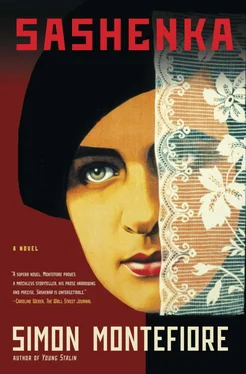Over the fence, the neighbor changed his gramophone record and started to sing along to one of Dunaevsky’s catchy songs from his jazz movie, The Jolly Fellows .
“Dunaevsky might come by for some zakuski later, Vanya,” she said. “Along with Utesov and some new writers too. Uncle Gideon’s bringing them. He might even persuade Benya Golden to come.”
“Who?” he said, his forehead crumpled as he tightened the bolts attaching a wheel to the bicycle.
“The writer whose stories on the Spanish Civil War I read recently,” she replied.
Vanya shrugged his bunched shoulders. Sashenka wished he was more interested in singers, writers and film stars. She was—and why shouldn’t she be? Vanya had once called them “a rackety bunch of unreliable elements—and your uncle Gideon is the worst.” She knew that Vanya preferred Party and military people but they could be so rigid and dry, and they were worse since the Terror. Besides, she was an editor, and her magazine was read by the wives of all the “responsible workers”—as the leaders were called. It was her job to know glamorous stars.
“Well, Satinov’s coming and so is Uncle Mendel if you want to talk politics,” she answered.
“How many have you asked?” he said, trying out the balance of the bike.
“I don’t know,” she answered dreamily. “It’s a big house…”
The dacha was a recent acquisition—and sometimes, in spite of herself, the sounds and smells reminded Sashenka of Zemblishino, the Zeitlin family estate where Mendel had converted her to Marxism.
Sashenka and Vanya had been assigned the dacha a year previously, in the summer of 1938, when they had also been granted the apartment on Granovsky and their driver. The cleansing of the Party had been a brutal and bloody process. Many had failed the test and fallen by the wayside, sentenced to death, the Highest Measure of Punishment in the official terminology. Some of Sashenka’s oldest friends and acquaintances had turned out to be traitors, spies and Trotskyites. She had never realized so many of them wore masks, pretending to be good Communists while actually being Fascists, saboteurs and traitors. With so many comrades vanishing into the “meat grinder,” as it was known, Sashenka had, like all her friends, culled their photos from the family photograph albums, scratching out their faces. Even she and Vanya had been worried, although they were completely committed to the rapture of the Revolution. Their marriage was a Communist marriage too. Sashenka and Vanya shared faith in the Party; for them, the faith was everything. They shared so much even if, she suddenly thought, the differences in their interests had become more marked as they grew older.
But the Terror was over now; they could breathe easy again. The country was ready and united for the coming war against the Hitlerite Fascists.
Vanya stood up and called Snowy, who came scampering around the corner with little Carlo trying to keep up.
“The bikes are ready.” He lifted her onto the seat. “Now take it slowly, Comrade Cushion, easy now, not too fast, feet on the pedals, now start to pedal…”
“Me too,” piped Carlo.
“Hang on, Carlo, oh Carlo…Don’t worry, bear cub, I’ve got you!”
“I’m a bunny, Papochka!” shouted the little boy furiously. His parents laughed. “Don’t laugh, silly Mummy!”
Sashenka smiled, her heart full of love for her small son. It didn’t matter if he was rude to her providing he was not rude to his father, who had a furious temper.
“Careful, Bunny,” she called. But it was too late. Desperate to catch up with his sister, he went too fast, swerved to avoid a chicken and fell off his bicycle.
“I want my mummy!” he sobbed.
Sashenka scooped him up again, at which he instantly stopped crying and demanded to go back on the bike.
“Look at me, look at me, Papochka and Mamochka!” He was off again.
“When aren’t we looking at you?” retorted Sashenka, tenderly. Turning round she could see that Snowy had mastered the bicycle. Triumphant, the little girl jumped off and danced away, waving her cushion.
“Right, it’s too hot and I’m hungry,” announced Vanya. “Brightness burns. I want you all out of the sun right now.”
An hour later, Sashenka, sitting cross-legged on the floor, was playing with the children in the nursery next to the Red Corner, with its posters of Lenin and Stalin, and the family radio mounted in a varnished oak casing. She could hear Razum and Vanya in the kitchen arguing about the soccer match between Dynamo Moscow and Spartak. Dynamo Moscow had played appallingly. Spartak had fouled the Moscow striker, who had been borne off the field, but the referee had not sent off the Spartak player.
“Perhaps he’s a saboteur!” Razum joked.
“Or maybe he needs new spectacles!”
No one would have laughed about a saboteur six months earlier, Sashenka reflected, even a soccer saboteur. People had been arrested and shot for lesser things. She recalled how the director of the Moscow Zoo had been detained for poisoning a Soviet giraffe, and how a schoolboy at School 118 near their Moscow apartment had been arrested for throwing a dart that accidentally hit a poster of Stalin. Whenever one of their friends was arrested, Vanya would close the kitchen door (so the children could not hear) and whisper the name. If it was someone famous like Bukharin, he would just shrug: “Enemies are everywhere.” If it was a good friend with whom they had holidayed in Sochi, for example, she would be mystified and concerned. “The Organs must know something but…”
“There’s always a reason,” he’d say. “It means it’s necessary.”
“The masks that people wear! The evil of our enemies beggars belief. Snowy was going to play with their children—”
“Cancel Snowy’s visit,” Vanya would say sharply, “and don’t call Elena! Careful!” He would kiss her forehead and no more would be said.
“You can’t make a revolution with silk gloves,” said Comrade Stalin, and Sashenka had repeated it to herself every day. But now Comrade Stalin had told the Eighteenth Congress that the Enemies of the People had been destroyed. Yezhov, the crazy secret-police boss, had been fired and arrested for his excesses, while the new Narkom of the NKVD, Lavrenti Beria, had brought back justice and moderation.
The men, their voices increasingly sticky from the succession of beers and the heat, were guffawing about a goal Vanya had scored in their amateur soccer team. Sashenka could not imagine why anyone would want to discuss soccer. She sighed. She and Vanya were opposites—he a worker of peasant origins, she an intellectual of bourgeois upbringing. But everyone knew that opposites make good marriages, and she had a kind, successful husband, two beautiful children, the drivers, the cars, this idyllic dacha—and now an American fridge.
Carolina started to set the big table on the veranda for an early May Day supper. Sashenka, who always held a party on May Day, thought about the evening ahead—and their guests. Uncle Gideon would bring his raffish friends and proposition somebody inappropriate, she supposed. There was a squeal. Carlo had grabbed Snowy’s beloved cushion and she was chasing him into the sitting room and out again, careering round the Red Corner, both laughing their heads off.
Sashenka walked onto the veranda, humming a tune, one of Liubov Orlova’s songs.
She stopped, jolted by a terrifying attack of happiness. She was on the right side of history; Soviet power, with its colossal steel plants and thousands of tanks and planes, was strong; Comrade Stalin was loved and admired. How much the Party had achieved! What joyous times she lived in! What would her grandfather, the Turbin rabbi, probably still alive in New York, have said about her dizzy happiness? “Don’t tempt the Fates.” That would have been his warning—all that nonsense about the Evil Eye and those dybbuks and golems. But this was just medieval superstition! There was much to celebrate.
Читать дальше












